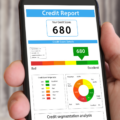Reporting Credit Report Inaccuracies
August 10, 2023
A credit report can tell a lot about a person financially. But what if some of the information isn’t correct? Inaccurate information in a credit report can negatively impact your score and ability to open new lines of credit. This is why reporting credit report inaccuracies is crucial. You have the right to dispute errors on your credit report. Fixing an error generally means contacting all parties involved in the transaction – the credit reporting agency as well as the company that provided the information.
Topics Covered: Ways to Dispute Credit Report Inaccuracies What Happens After You Dispute? Does Disputing Impact Credit? How Can CreditU Help? Key Insights
Ways to Dispute Credit Report Inaccuracies
-
Start with a free annual credit report check
The first step is to get a copy of your credit report from one of the three main credit bureaus – Experian, Equifax, and TransUnion. Each of these bureaus must provide you with a free credit report once a year. Carefully study your credit report to find errors, such as incorrect personal or account information or fake accounts.
-
Address the disputes with the credit reporting agencies
You should dispute any errors on your credit report immediately. Provide relevant paperwork, such as a copy of your credit report with the error circled and any additional supporting documents.
If you mail a dispute, your dispute letter should include:
Contact information for you, including your complete name, address, and telephone number.
Credit report confirmation number, if available.
Each error you want fixed, including the account number for any account you may be disputing.
Clear explanation of why you are disputing the information.
Request that the information be removed or corrected.
A copy of the portion of your credit report that contains the disputed items, with the disputed items circled or highlighted.
Copies (not originals) of documents that support your position.
You can choose to send your dispute letter by certified mail and ask for a return receipt, so that you have a record that your letter was received.
You can contact the nationwide credit reporting companies online, by mail, or by phone:
Equifax
Online: www.equifax.com/personal/credit-report-services/credit-dispute/
By mail: Download the dispute form and mail the dispute form with your letter to:
Equifax Information Services LLC
P.O. Box 740241
Atlanta, GA 30374
By phone: Call the phone number shown on your credit report or call (866) 349-5191
Experian
Online: www.experian.com/disputes/main.html
By mail: Use the address provided on your credit report or mail your letter to:
Experian
P.O. Box 4500
Allen, TX 75013
By phone: Call the phone number shown on your credit report or call (888) 397-3742
TransUnion
Online: dispute.transunion.com
By mail: Download the dispute form and mail the dispute form with your letter to:
TransUnion Consumer Solutions
P.O. Box 2000
Chester, PA 19016-2000
By phone: (800) 916-8800, Monday – Friday 8 a.m. 11 p.m. ET, Saturday and Sunday 8 a.m. – 5 p.m. ET.
Keep copies of your dispute letter and the documents you send with it.
-
Dispute with the creditors who reported the information to the bureaus.
Credit reporting agencies gather their information from other organizations. These can be establishments such as your banks, landlords. Credit card companies etc. Informing these entities of the errors are also crucial to making the corrections. You can get in touch with these companies through their customer support lines as well as their websites. Just as you do it with the agencies make sure you include all the information related to your errors in your dispute letter to these organizations.
What Happens After You Dispute?
The credit reporting company investigates
Once you send in the dispute letter to the agencies, they will start to investigate your dispute. In the process, they will forward copies of any relevant documentation to the organizations that provided the information about you. The agencies will then report the results back to you.
If your dispute claim is invalid the credit reporting agency is not required to take any action. However, the agency must send a notice stating that the dispute is invalid. This notice must be sent to you within five business days after they made the decision.
The organization providing the information to the credit reporting agencies makes the correction and notifies the credit agencies.
Your bank, landlord or other responsible party to correct your information are responsible to notify the credit reporting agencies after the correction is made at their end. Once the reporting agencies receive this information, they will update your credit reports.
You still have the right to challenge an inaccuracy even if the credit bureau finds the information valid. You should offer more data or supporting paperwork to strengthen your dispute. To contest inaccuracies, you can also speak with the creditor personally. Keep copies of all communications and documents about your dispute.
The chance of finding inaccurate information is one of many good reasons to check your report regularly. Reporting credit report inaccuracies is crucial for your financial health.
Does Disputing Impact Credit?
The simple answer is No. However, once the dispute process is complete, any changes that occurred in your report may have an impact on your credit scores. Weather it is a positive, negative or a neutral impact depends on the nature of your dispute and its outcome. For example if your dispute was about mistakes regarding late payments or unpaid collections accounts your core will potentially increase with the correction. If you are only correcting your personal information, your credit scores will not have a real impact or change.
How Can CreditU Help?
Managing your finances can be a challenging task, especially if you are not sure where to start. Thankfully, CreditU, our all-new finance app, is here to help you keep your credit on track. Keeping tabs on your credit reports and credit scores is crucial to maintaining good financial health.
With CreditU not only you can track how much you are spending on your credit cards, but you can also keep track of your debt-to-income credit ratio to make sure your finances are healthy. With our paid version of the CreditU App you can keep tabs on your credit alerts, your credit report and can have access to credit scores.
Overall, CreditU is an excellent tool for anyone looking to take control of their finances. With its intuitive interface, customizable budgeting tools, and powerful goal-setting features, the app makes it easy to create a budget that works for you and to stay on track towards your financial goals. So why wait? Download CreditU today and start taking control of your financial future!
Key Insights – Reporting Credit Report Inaccuracies
1. Making use of all the available resources to keep tabs of your credit report ensures the security of your financial health.
2. Inaccurate information in a credit report can negatively impact your score and ability to open new lines of
credit. This is why reporting credit report inaccuracies is crucial.
3. You should dispute any errors on your credit report immediately. Provide relevant paperwork, such as a copy of
your credit report with the error circled and any additional supporting documents.
4. Keeping records of all your documentation when you submit a dispute is crucial to tracking the status of your dispute.
Back To Top
Last Updated on February 1, 2024 by Dilini Dias Dahanayake







